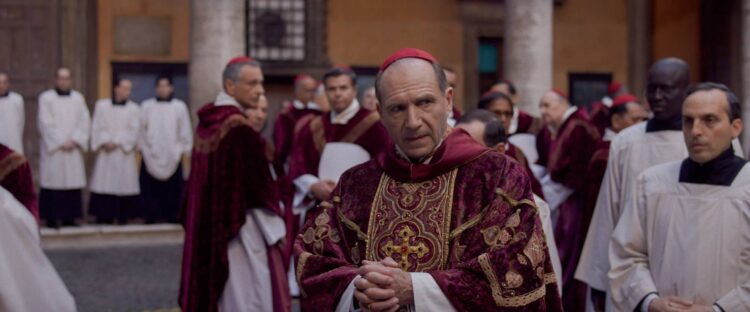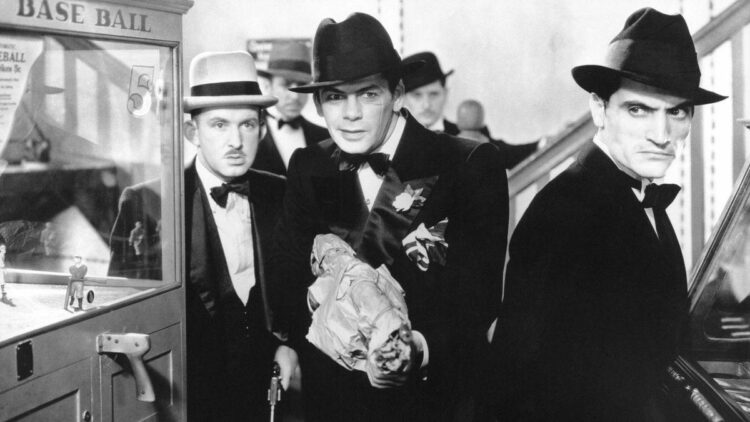

The twisty political thriller Conclave wastes little time getting right into it: the Pope is dead, and after a three-week time jump, the world’s most powerful cardinals gather in Vatican City, their mission to elect a new leader from among their ranks.
Our window into this closed world is Cardinal Lawrence, portrayed in characteristically sturdy fashion by Ralph Fiennes. Dean of the College of Cardinals, Lawrence is in charge of this conclave, and while he takes his duties very seriously, they’re complicated by a recent request to the (now-dead) Pope to resign his post and be sent elsewhere so that his faith might be reignited. Request denied––perhaps because the former pope knew he needed him to run this forthcoming conclave––Lawrence finds himself in a position of immense power. As a reluctant leader with deep convictions (but still capable of missteps), he is a relatable window into this foreign world.
As one might expect, cardinals immediately splinter off into factions and begin scheming, hoping to put forth candidates that represent their viewpoints while maintaining just enough broad appeal to garner votes from the larger populous of peers. If this sounds familiar, that’s because Conclave operates as a thinly veiled allegory of American politics. The previous Pope’s reign opened the door for more progressive policies within the historically conservative Catholic church, and a small subset––including Lawrence and Cardinal Bellini (Stanley Tucci)––are terrified that other cardinals see this conclave as an opportunity to correct course. To Bellini, Lawrence, and allies, the worst-case scenario would be an ascension of openly racist and homophobic Italian candidate Tedesco (Sergio Castellitto). Parallels to our current political moment are often stated forthright. Conclave is not a film with much interest in subtext, for better or worse.
Our perspective is placed squarely within Lawrence and this small team pushing for Bellini. This group was close to the former Pope and as such they carry a teacher’s-pet entitlement that can make them difficult to root for, even if you understand and agree with their agenda.
Conclave’s bread and butter are the voting sessions, which take place in the Sistine Chapel, and the narrative wisely takes its time getting to that dramatic first vote. Like all things Catholic Church, the process is archaic: handwritten paper votes are placed in an urn and the results are read aloud. Each vote-count offers an endless array of possibilities, whether a frontrunner extending a lead or losing momentum, or a surprise new candidate joining the mix. Despite their frequency, these scenes never lose their power.
Agatha Christie has been mentioned in relation with Conclave, and there is a classic murder-mystery feeling to how front-runners are dispatched (through scandal, not outright murder) one by one. When Bellini accuses Cardinal Lawrence of harboring secret ambitions of becoming Pope himself––despite his insistence otherwise––it’s hard not to wonder if Lawrence might be carefully biding his time, content to be the last man standing. Newcomer Cardinal Benítez (Carlos Diehz) represents the classic mysterious stranger whose motivations are not readily available. And there’s the matter of his secret stint at a hospital in Switzerland, which Lawrence sends an aide to look into.
Peter Straughan’s (Tinker Tailor Soldier Spy) adaptation of a Robert Harris (The Ghost Writer) novel deftly tracks changing power dynamics so that we’re always aware of who’s in the lead and who might be ready to make a push. Director Edward Berger and cinematographer Stéphane Fontaine complement Straughan’s script with showy visuals, the muddy trenches of Berger’s breakout All Quiet on the Western Front replaced with lavish interiors, centuries-old frescos, and ornate objects that populate the Vatican. After the severity of All Quiet, it’s nice to see Berger letting loose and having fun here, and it’s no surprise to hear he is being courted to direct the next Ocean’s film.
With the focus squarely on a left-wing-versus-far-right setup, theological ideas are just present enough to not read as a glaring omission. Cardinal Lawrence gives a perfunctory sermon about the importance of doubt and dangers of conviction––faith would not exist without uncertainty. In one standout scene, Benítez is admonished by Lawrence for continuing to vote for him. Lawrence is not a serious candidate, and as such Benítez’s vote is best cast elsewhere. It’s too important to prevent the dangerous Tedesco from ascending to power. Benítez is unmoved––he will only vote for the man he feels worthy of being pope. God doesn’t only use followers who are ready and able to serve. It’s a nice reminder to stick to one’s convictions even when opting for a “lesser evil” might be the prudent decision. Conclave offers just enough moments like these, though its real priority is keeping viewers on the edge of their seats as a power struggle ensues inside one of the world’s oldest institutions.
Late in the film, the outside world interrupts the insular conclave in a shocking moment. Its inclusion is too deus ex machina to take seriously, though if there was ever a narrative for God to intervene directly within his machine, this would be the one. Thus a rapid succession of late developments including a two-part final twist which elicited continuous laughter from the audience in my screening––Fiennes’ incredulous “you must be kidding me” reaction getting a lot of mileage––an indication of a clear tonal mistake.
More airport paperback than theological treatise, Conclave is undeniably silly throughout, but its last-second reveals choreograph the sensibility too openly, undercutting much of what was masterfully unfurled up until that point.
Conclave screened at the 2024 Toronto International Film Festival and opens on November 1.
The post TIFF Review: Conclave is an Engaging Political Thriller Undone by Ridiculous Third Act Twists first appeared on The Film Stage.



